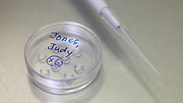
'Couples will be told at a logical, reasonable stage that it’s time to move on to an egg donation'
Photo: Shutterstock
The Health Ministry has decided to limit the number of in vitro fertilization (IVF)
treatments a woman can undergo in Israel.
Until now, women trying to get pregnant were entitled to an unlimited number of subsidized IVF treatment cycles.
hpThe Health Ministry memo, issued by Director of Health Administration Prof. Amnon Afek, suggests that the medical staff treating the woman, including a social worker, will discuss the reasons for the failure to achieve a pregnancy and consider how to move on.
According to the new policy, a woman will be able to undergo up to eight treatment cycles. If she fails to get pregnant after eight treatments, the medical staff will discuss her condition and decide whether she should continue the process.
Revolution
Health Minister Yael German unveils bill stipulating that gays can use proxy mothers to bring children into world without leaving country, process for all potential parents shortened
"The current situation is absurd," explained Prof. Moshe Ben-Ami, chairman of the Israel Society of Obstetrics and Gynecology. "We are forced to treat couples whose health we are certainly damaging, who are visiting hospitals for nothing and missing work, and are just wasting resources without any benefit. The couple demands, and we couldn't say no.
"This memo allows us to say at a logical and reasonable stage that we have exhausted this option and that it's time to move on to the egg donation stage."
Maximum age for IVF to remain 45
While the National Council for Gynecology, Neonatology and Genetics recommended restricting IVF treatments to women under the age of 44, the Health Ministry has decided to leave the maximum age for IVF at 45.
In accordance with the Council's recommendation, women will be able to begin IVF treatments as a first option at the age of 39, due to the sharp drop in fertility at the age of 40. Until now, women were entitled to start the IVF process only after undergoing three conventional treatments.
"In vitro fertilization is the most successful treatment, but before the age of 39 there are other good options," says Prof. Ben-Ami. "At these ages the chances of achieving a pregnancy are small, and every month can be critical in terms of losing the ability to get pregnant, and so if a doctor thinks a certain woman should start with in vitro fertilization right away, it will be possible."
The Health Ministry believes that a woman who cannot achieve a pregnancy naturally will be able to get pregnant much more easily through IVF.
Another new restriction is on women over the age of 42, who will be entitled to up to three treatment cycles which fail to reach the stage of embryo transfer. Until now, there has been no limitation on the number of treatments these women were entitled to.
"These recommendations regulate the issue of IVF treatments, on the one hand allowing women to fulfill their right to motherhood and parenthood, and on the other hand caring for their health," said Health Minister Yael German.
Ofra Balaban, chairwoman of the Chen patient fertility association, welcomed the new policy. "The efficiency of treatment cycles is up to the sixth cycles. This will free up money for conducting necessary genetic testing on women, which will really help them to get pregnant."















